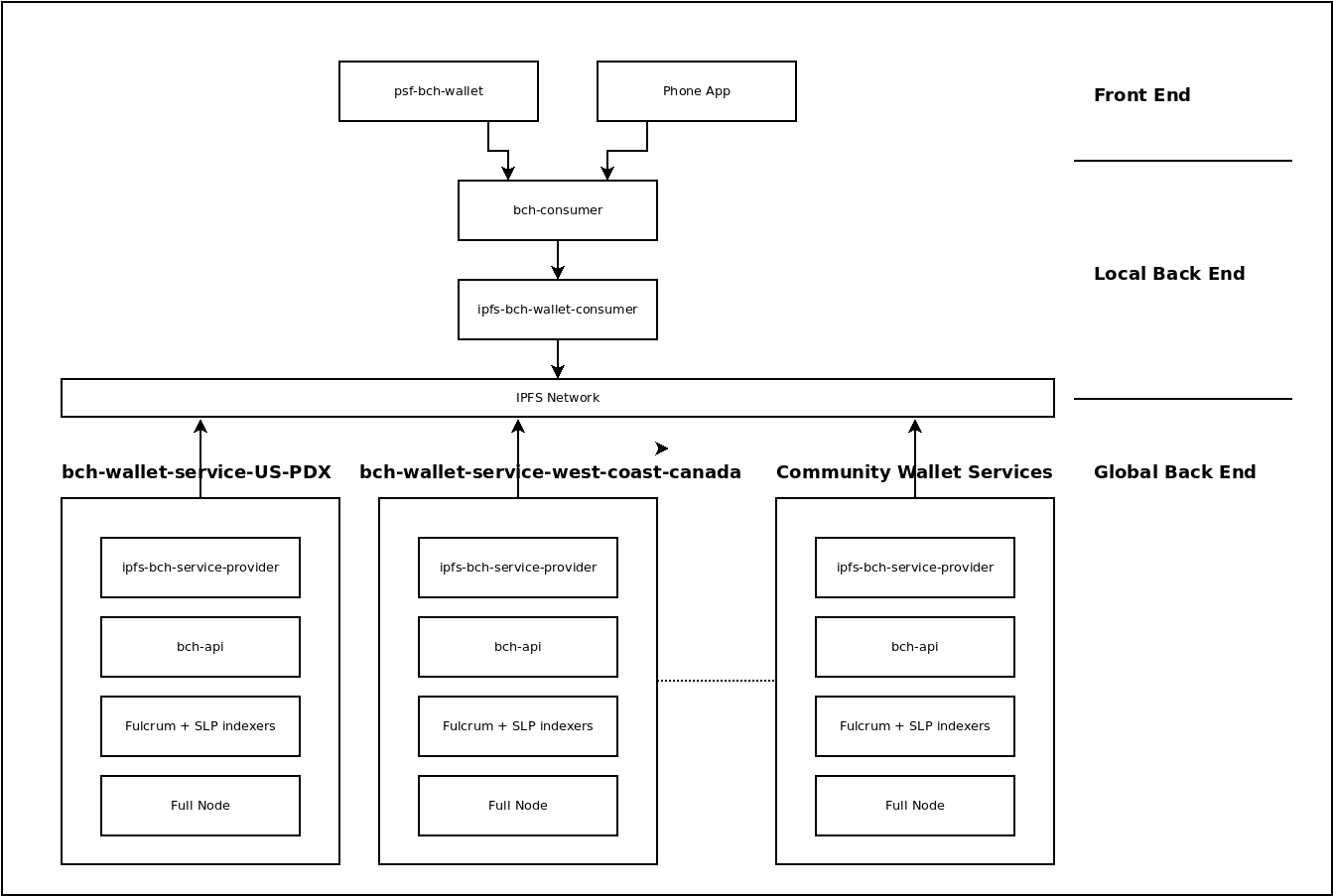Local Back End
The concept of a 'local' back end does not apply to the web 2 paradigm. It's a new concept that only applies in the realm of web 3.
As illustrated in the introduction, web 2 architecture has a centralized back end which the front end interacts with directly. In our web3 architecture, apps connect to a light-weight 'local' back end, which then proxies the communication over IPFS to a 'global' back end.
The main advantages of the web 3 architecture is reducing cost and improving censorship resistance.
ipfs-bch-wallet-consumer
The core piece of software making up the local back end is ipfs-bch-wallet-consumer. This app provides a REST API interface for front end apps to query data about the blockchain (and broadcast transactions).
ipfs-bch-wallet-consumer is configured to connect to one-of-many global back end services. This connection can change on-the-fly during operation in order to optimize performance. ipfs-bch-wallet-consumer connects to its mirror-image on the global back end: ips-bch-wallet-service. This connection happens by passing end-to-end encrypted (e2ee) messages over the IPFS network.
 A dependency graph, showing how front end apps connect to Web 3 back end services.
A dependency graph, showing how front end apps connect to Web 3 back end services.
bch-consumer
Front end apps can connect directly to ipfs-bch-wallet-consumer via its REST API. This is the best option for non-JavaScript applications. But JavaScript applications can leverage the bch-consumer npm library.
bch-consumer is a JavaScript library which provides an easy interface for interacting with ipfs-bch-wallet-consumer. It was inspired by the older bch-js JavaScript library, which has similar functionality for the older web 2 architecture.
psf-bch-wallet
psf-bch-wallet is a command-line interface (CLI) application. It is the 'power tool' for Cash Stack developers. psf-bch-wallet is...
- A wallet for managing cryptocurrency and tokens.
- A rapid prototyping tool for trying out new ideas.
- An app for controlling and configuring
ipfs-bch-wallet-consumer. - A diagnostic tool for debugging network issues.
- A encrypted message app.
- An interface to the pay-to-write database (P2WDB).
Wallets and Rapid Prototyping
The obvious use of psf-bch-wallet is to manage wallets containing BCH and SLP tokens. The CLI app contains all the features available in wallet.fullstack.cash, plus many additional features. Because there is no cumbersome user interface to deal with, it's much faster for JavaScript developers to hack on the CLI wallet and rapidly prototype new ideas.
Controlling ipfs-bch-wallet-consumer
psf-bch-wallet is the primary way for issuing commands and controlling the network behavior of ipfs-bch-wallet-consumer. The wallet-service command will list all the global back ends that ipfs-bch-wallet-consumer can see on the network. The same command with a -s flag can instruct ipfs-bch-wallet-consumer to connect to a different global back end. Once connected, the wallet-service-test command will run diagnostic tests to ensure the global back end is fully functional and responsive.
By default, psf-bch-wallet connects to free-bch.fullstack.cash, which is a publically available instance of ipfs-bch-wallet-consumer, but its uptime is not guaranteed. The conf command is used to switch to a local instance of ipfs-bch-wallet-consumer. Here is an example for switching to a local instance of ipfs-bch-wallet-consumer running on port 5005:
./bin/run conf -k restServer -v http://localhost:5005
Network Diagnostics
The different ipfs-* commands are used for running diagnostics on the IPFS network. These commands are used to interrogate the IPFS node connected to ipfs-bch-wallet-consumer. You can list all the connected IPFS peers, and get information on connected Circuit Relays. Circuit Relays are a critical element in networking and censorship resistance.
Encrypted Messaging
psf-bch-wallet can send encrypted messages to any other bitcoincash: address. It can also decrypt and display any encrypted messages sent to your wallet. These messages are end-to-end encrypted (e2ee) using the same eliptic-curve encryption used to make Bitcoin payments.
Pay-to-Write Database
The pay-to-write database (P2WDB) is a censorship-resistant database. It's similar in many ways to a blockchain, but better optimized for storing data. psf-bch-wallet can read and write data to the P2WDB. Raw data can be reviewed at explorer.fullstack.cash.